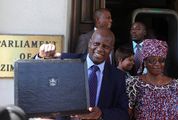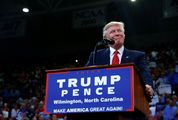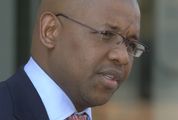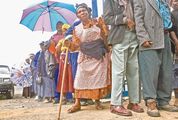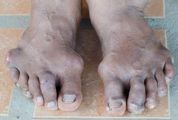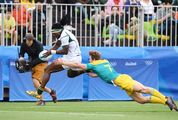SOUTH Africa’s young democracy, ushered into this world by Nelson Mandela and his generation, has yet to pass its ultimate test: a majority vote against his party, the African National Congress (ANC), and the smooth transition to a different national government.
It is a test Mandela will not see, and one the ANC certainly does not wish to indulge, set as it is on ruling "until Jesus returns". Nevertheless, it remains the greatest hurdle for any democracy and in particular those new to the African continent, which has a disturbing history of liberation movements long overstaying their welcome and perverting their democratic credentials to dictatorial and demagogic ends.
No democracy can claim to be fully formed until it successfully crosses this threshold. Many, including our Zimbabwean neighbours, have tried and failed. And it is ironic indeed that, to achieve it, one would have to effectively vote against Mandela himself; for the ANC has done much to disingenuously try to cover its contemporary shortcomings in the cloak of Mandela’s historical glories. It is by no means the be-all and end-all of Mandela’s contribution but, if realised, it would be the definitive confirmation of it: a society mature, stable and self-confident enough to embrace and withstand democratic change.
It is a difficult question to ask, so intricately has the ANC associated itself with Mandela. To answer it, one must separate his principles from his party’s politics, for freedom and the ideals that define it are universal. If Mandela belongs to all of us, so does what he stood for. And that is a mirror even the ANC must look into. It is unfortunate that it should have to be asked of the ANC, but the most important questions are often the hardest and that is no reason to shy away from it or close our collective mind to its importance.
Should South Africa fail that test, whenever it does present itself, Mandela’s legacy will be denuded of some of its worth. And that would be a sad day indeed. Perhaps it is unfair to wholly associate that possibility with Mandela. You can lead a horse to water, they say, but you cannot make it drink. However, as we take time out to consider in great depth the man’s life and pledge never to forget and always to aspire to the values and principles he stood for, then how seriously we take this requirement must likewise reflect how seriously he took democracy.
Mandela has alluded to this fundamental principle before. His now often-quoted 1993 remark that, "If the ANC does to you what the apartheid government did to you, then you must do to the ANC what you did to the apartheid government," speaks powerfully to it. Of course, the breaking point need not be the reinvention of apartheid itself. Basic good governance should be the measure.
On that front, on the evidence, the high water has already been breached and the tide is rising further still. That it was passed while Mandela still lived says something about the degree to which he remained faithful to the ANC. For that he cannot be entirely blamed; politics necessitates and engenders loyalty, but it too has its limits.
Writing for The New York Times, Zakes Mda observed last week: "I fear that, for Mandela, loyalty went too far. The corruption that we see today did not just suddenly erupt after his term in office; it took root during his time. He was loyal to his comrades to a fault, and was therefore blind to some of their misdeeds."
There might well be much truth to that, but in and between his many public statements on best democratic practice, that 1993 ideal can be found staring back at you. Ironically, then, Mandela embodied the contradiction and the test he has left South Africa to solve: at what point does loyalty become blind loyalty?
Blind loyalty is, of course, unthinking. It is to sacrifice one’s critical faculties in the name of obsequiousness and, with that, to unquestioningly outsource one’s own interests to a third party. Without such questions, there is no expectation of those in whom so much power has been vested to account for their actions. Self-interest is a powerful drug indeed, a potential addiction quickly augmented by free reign. And there is blind loyalty and self-indulgence aplenty in South Africa today.
It also shares a connection with forgiveness, Mandela’s defining contribution. If the lesson we have learnt from the man is to forgive, the question that arises is when too much forgiveness becomes an injustice. The ANC has done an immeasurable amount for South Africa, but how much forgiveness should voters grant it as it strays from the path? At what point does forgiveness do more harm than accountability? Mandela gave us the one in droves, but the other he left to us, the people, to determine.
No doubt Mandela never intended to bestow that on South Africa as a legacy. But he has left us with a question. How we answer it will say just as much about the lessons we learnt from him as it does of his legacy.
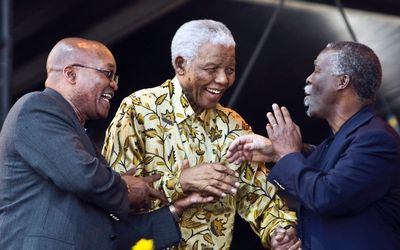
THREE LEADERS: Nelson Mandela celebrates his 90th birthday with then president Thabo Mbeki and African National Congress leader Jacob Zuma at Loftus Stadium in August 2008. Picture: GALLO IMAGES
SOUTH Africa’s young democracy, ushered into this world by Nelson Mandela and his generation, has yet to pass its ultimate test: a majority vote against his party, the African National Congress (ANC), and the smooth transition to a different national government.
It is a test Mandela will not see, and one the ANC certainly does not wish to indulge, set as it is on ruling "until Jesus returns". Nevertheless, it remains the greatest hurdle for any democracy and in particular those new to the African continent, which has a disturbing history of liberation movements long overstaying their welcome and perverting their democratic credentials to dictatorial and demagogic ends.
No democracy can claim to be fully formed until it successfully crosses this threshold. Many, including our Zimbabwean neighbours, have tried and failed. And it is ironic indeed that, to achieve it, one would have to effectively vote against Mandela himself; for the ANC has done much to disingenuously try to cover its contemporary shortcomings in the cloak of Mandela’s historical glories. It is by no means the be-all and end-all of Mandela’s contribution but, if realised, it would be the definitive confirmation of it: a society mature, stable and self-confident enough to embrace and withstand democratic change.
It is a difficult question to ask, so intricately has the ANC associated itself with Mandela. To answer it, one must separate his principles from his party’s politics, for freedom and the ideals that define it are universal. If Mandela belongs to all of us, so does what he stood for. And that is a mirror even the ANC must look into. It is unfortunate that it should have to be asked of the ANC, but the most important questions are often the hardest and that is no reason to shy away from it or close our collective mind to its importance.
Should South Africa fail that test, whenever it does present itself, Mandela’s legacy will be denuded of some of its worth. And that would be a sad day indeed. Perhaps it is unfair to wholly associate that possibility with Mandela. You can lead a horse to water, they say, but you cannot make it drink. However, as we take time out to consider in great depth the man’s life and pledge never to forget and always to aspire to the values and principles he stood for, then how seriously we take this requirement must likewise reflect how seriously he took democracy.
Mandela has alluded to this fundamental principle before. His now often-quoted 1993 remark that, "If the ANC does to you what the apartheid government did to you, then you must do to the ANC what you did to the apartheid government," speaks powerfully to it. Of course, the breaking point need not be the reinvention of apartheid itself. Basic good governance should be the measure.
On that front, on the evidence, the high water has already been breached and the tide is rising further still. That it was passed while Mandela still lived says something about the degree to which he remained faithful to the ANC. For that he cannot be entirely blamed; politics necessitates and engenders loyalty, but it too has its limits.
Writing for The New York Times, Zakes Mda observed last week: "I fear that, for Mandela, loyalty went too far. The corruption that we see today did not just suddenly erupt after his term in office; it took root during his time. He was loyal to his comrades to a fault, and was therefore blind to some of their misdeeds."
There might well be much truth to that, but in and between his many public statements on best democratic practice, that 1993 ideal can be found staring back at you. Ironically, then, Mandela embodied the contradiction and the test he has left South Africa to solve: at what point does loyalty become blind loyalty?
Blind loyalty is, of course, unthinking. It is to sacrifice one’s critical faculties in the name of obsequiousness and, with that, to unquestioningly outsource one’s own interests to a third party. Without such questions, there is no expectation of those in whom so much power has been vested to account for their actions. Self-interest is a powerful drug indeed, a potential addiction quickly augmented by free reign. And there is blind loyalty and self-indulgence aplenty in South Africa today.
It also shares a connection with forgiveness, Mandela’s defining contribution. If the lesson we have learnt from the man is to forgive, the question that arises is when too much forgiveness becomes an injustice. The ANC has done an immeasurable amount for South Africa, but how much forgiveness should voters grant it as it strays from the path? At what point does forgiveness do more harm than accountability? Mandela gave us the one in droves, but the other he left to us, the people, to determine.
No doubt Mandela never intended to bestow that on South Africa as a legacy. But he has left us with a question. How we answer it will say just as much about the lessons we learnt from him as it does of his legacy.



